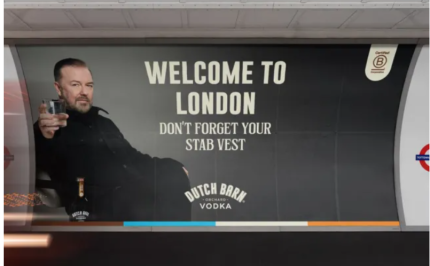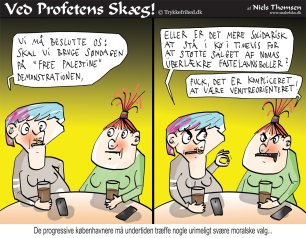Ricky Gervais has once again done what no civil servant or media-trained communications officer dares anymore: he’s said what everyone knows, but no one is allowed to say out loud.
“Welcome to London. Don’t forget your stab vest,” reads one of the ads for his Dutch Barn Vodka – and with that line alone, without a single political statement, he summed up modern Britain.
An advert reminding people to bring a stab vest on the Tube isn’t just dark humour. It’s a comment on a capital where knife crime has become so ordinary that satire is the only decent language left.
And perhaps that’s why Transport for London (TfL) couldn’t stomach it.
According to Gervais, the darkly satirical Dutch Barn posters – besides the stab-vest one, also lines like “One day you’ll be underground for good,” “Drugs this good are usually illegal,” and “Dutch Barn – your Tube driver’s favourite drink in the morning” – were rejected by TfL.
TfL, in turn, claims they were never formally submitted for approval. A classic piece of British bureaucracy – a “no” disguised as “we haven’t actually seen anything.”
Whatever the bureaucratic truth, the point stands:
In today’s Britain, there are subjects you’re simply not allowed to mention, not even in jest. Better to ride the Tube without a stab vest – than with a sense of irony.
Satire and Its Forbidden Reality
As Gervais’s fans quickly noticed, there was an eerie timing between his “stab vest” ad and real life.
Just days after the poster began circulating on social media, a train from Doncaster to London became the scene of a mass stabbing in which eleven people were injured – nine of them seriously.
The Metropolitan Police have since arrested a 32-year-old British man of Caribbean descent from Peterborough.
And that’s how it’s phrased: “a British man of Caribbean descent.”
Notice the linguistic choreography – nationality first, ancestry in the subordinate clause – a half-transparent attempt to deflect what The Guardian called “far-right speculation online.”
When Facts Get an Ideological Filter
ere, language itself becomes part of the story.
It’s not only advertisements that are censored; reality is translated so as not to disrupt the official narrative.
When, in October 2025, the Met Police announced they would no longer pursue so-called non-crime hate incidents – that is, events that aren’t illegal but “might cause offence” – the Commissioner explained that “officers should not be policing toxic culture-war debates.”
In other words: they will no longer waste resources monitoring language – deciding who says or writes something that might be deemed toxic in public discourse.
But that doesn’t change the fact that the very notion of “toxic” is still defined from above, and anyone asking the wrong questions still risks being labelled a “far-right speculator.”
‘Far-Right’ Is the New ‘Inconvenient’
It’s the British version of Denmark’s “you can’t say that.”
When satire hits home, it’s “offensive.”
When citizen journalists question the background of perpetrators, they’re “far-right speculators.”
And when the public demands truth, it’s handed a committee report on “inclusive communication standards.”
The result is a country that no longer protects free speech – it administers it.
That vacuum breeds alternative voices such as Tommy Robinson who – a citizen journalist – fills a gap the mainstream media dug themselves.
When people sense that truth is being edited, they will listen to those who speak without a filter.
Humour as the Last Truth
Gervais gets this instinctively.
He isn’t just selling vodka; he’s selling free thought.
When he says “Enjoy life, you’ll be dead soon,” it’s not mere black humour – it’s a manifesto of freedom.
When he says “One day you’ll be underground for good,” it’s a reminder that modern London quite literally lives with death at its back.
And when TfL hesitates to display the posters lest someone be offended, they reveal precisely the spiritual condition Gervais is mocking: a society so afraid of reality that it can no longer face its own satire.
Tragicomic Britain
o yes – Ricky Gervais’s ads are funny.
But they are also the most accurate sociological portrait of Britain right now:
A country where you can be attacked on the train, but not laugh about it in an advert.
A country where police drop free-speech investigations yet still try to regulate tone.
And where the greatest taboo is no longer the violence itself – but the person who points it out.
“Don’t forget your stab vest.”
It ought to be printed on every campaign poster, every TfL report, and every press release from Scotland Yard.
Because behind the humour lies a truth only British satire can carry:
When truth is forbidden, laughter becomes the last place where it can still be heard.



